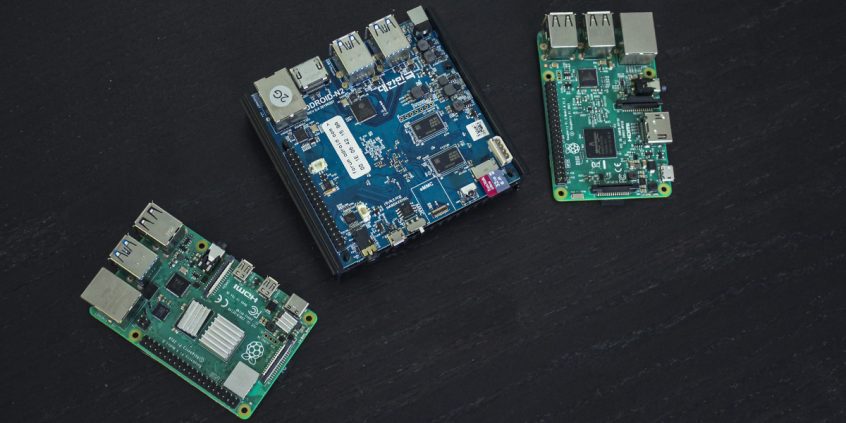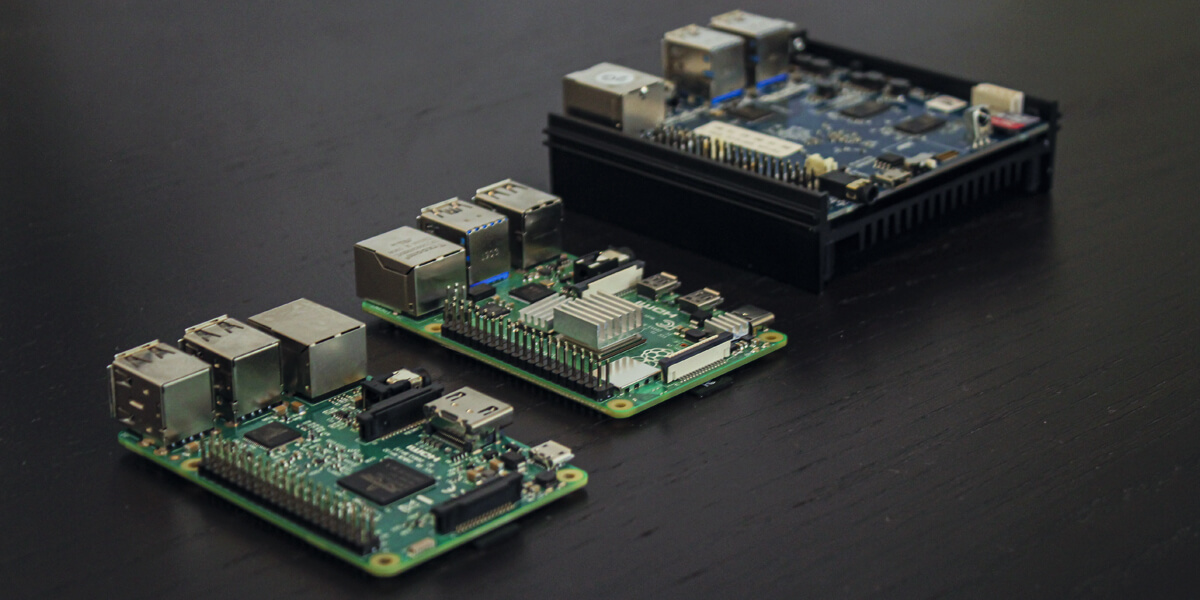Raspberry Pi vs Odroid: Which Is Faster as a Wired Router?

The Speedify Showdown Part 2 – Raspberry Pi vs Odroid as Wired Routers
In Part 1 of this Raspberry Pi vs. Odroid series we tested iPerf3 downloads over Speedify with the Raspberry Pi 3B, Raspberry Pi 4B, and the ODroid N2. In this part 2, we’re setting the devices up to share the Speedify connection over Ethernet and running the iPerf client on a connected laptop.
Which of them do you think will be the fastest? Keep reading and find out!
Raspberry Pi vs. Odroid – Setting Up Testing
Premise: we want to find out which of the three devices is best for using as a wired router to share Internet over Ethernet.
Internet sharing setup
Once again, each device is hooked up via Ethernet to a Verizon Fios Gigabit Internet connection. Devices were set up to share the connection over Ethernet using the sharing options included with Speedify for Linux.
Tests were run on a Ubuntu 18.04 laptop connected to the Ethernet, using iPerf3 with a single TCP stream against the Northern Virginia #2 Speedify server (without Speedify running for the first test). Over this Internet connection, the available bandwidth for a single TCP stream to the Nova 2 server was typically around 820 – 850 Mbps. Some of the limitations below are with the available network bandwidth and not the devices themselves.
As a reminder, here are the summarized results from the last round of testing – iPerf client running right on the Raspberry Pi / Odroid:
|
Device |
Adapters |
No Speedify |
Speedify, Encryption Off |
Speedify, Encryption On |
|
Odroid N2 |
Built in ethernet, eth0 |
846 |
814 |
808 |
|
Raspberry Pi 3 |
Built in ethernet, eth0 |
95 |
91 |
93 |
|
USB ethernet eth2 |
272 |
265 |
267 |
|
|
Raspberry Pi 4 |
Built in ethernet, eth0 |
818 |
799 |
579 |
Testing Out Raspberry Pi vs Odroid as Wired Ethernet Routers

This time, we test from a laptop connected to the shared Ethernet, with Speedify on, and encryption on:
|
Device |
Adapters |
Run 1 (Mbps) |
Run 2 (Mbps) |
Run 3 (Mbps) |
Avg (Mbps) |
|
Odroid N2 |
Built in Giga Ethernet, shared over USB Ethernet |
774 |
785 |
780 |
780 |
|
Raspberry Pi 3 |
Built in 100 Mbps Ethernet, shared over USB Ethernet |
90 |
90 |
90 |
90 |
|
Internet Ethernet USB, shared over USB Ethernet |
145 |
146 |
149 |
147 |
|
|
Raspberry Pi 4 |
Built in Giga Ethernet, shared over USB Ethernet |
294 |
294 |
294 |
294 |
Odroid N2 manages to deliver to its Ethernet client around 88% of the performance that it got running the iPerf client itself (780 Mbps / 808 Mbps). Smaller packets coming in over the Ethernet cause it to use a bit more bandwidth on headers, which costs it a few percentage points of performance.
The Raspberry Pi 3B using the built in 100 Mbps Ethernet card is simply stuck at 90 Mbps throughput that built in card can deliver. When using two USB Gigabit Ethernet cards, it gets just over 50% of the speed it got using just one of those cards to connect to the internet. The reason is the USB 2.0 bus which can only deliver about 300 Mbps of total throughput divided among all of the connected devices. Bringing each packet in from the internet and then back out to the client over that same bus cuts the total throughput in half.
We were quite surprised to see how much worse the Raspberry Pi 4 performed than the Odroid N2 (although, it must be said it is exactly twice as fast as the Raspberry Pi 3!). The Raspberry Pi 4 has a dedicated bus to the built in the Ethernet card, and another multi-gigabit bus to the shared USB ports.
How Do the Raspberry Pi’s and Odroid Perform without Encryption?
So, once again we try turning off encryption on Speedify and run the tests again;
|
Device |
Adapters |
Run 1 (Mbps) |
Run 2 (Mbps) |
Run 3 (Mbps) |
Avg (Mbps) |
|
Odroid N2 |
Built in Giga Ethernet, shared over USB Ethernet |
773 |
797 |
794 |
788 |
|
Raspberry Pi 3 |
Built in 100 Mbps Ethernet, shared over USB Ethernet |
88 |
89 |
88 |
88 |
|
Internet Ethernet USB, shared over USB Ethernet |
145 |
147 |
146 |
146 |
|
|
Raspberry Pi 4 |
Built in Giga Ethernet, shared over USB Ethernet |
363 |
370 |
379 |
371 |
The Raspberry Pi 3 and the Odroid are unchanged. The Odroid is limited by the Internet speed, and the Raspberry Pi 3 was limited by its own internal bus. In neither case did the encryption amount to a performance bottleneck.
But the Raspberry Pi 4 has jumped in speed by 26%, to 371 Mbps. The Raspberry Pi 4 is bottlenecked on CPU performance. Again we see that the Raspberry Pi 4 is really hamstrung by its lack of AES hardware.
Raspberry Pi vs Odroid as Wired Routers – Conclusions

The takeaways are similar to our last round of testing. If you need performance, the Odroid N2 is your device. We never saw it deliver less than 773 Mbps on any test. Given that we were limited by 850 Mbps of available bandwidth to the server, we’re not sure that we ever saw anything like this device’s actual top speed.
The Raspberry Pi 3 is showing its age. Depending on your setup the maximum speed you can get could be as low as 88 Mbps.
The Raspberry Pi 4 is fine for speeds of over 200 Mbps with or without encryption. With our obsessive need to max out every internet connection, the Raspberry Pi 4 does disappoint us. But of course, it depends on what you’re doing with it.
For an IRL streaming backpack, you really just need to maintain a consistent speed of around 30 Mbps despite all the real world issues (range, movement, interference, etc.). For these users, a Raspberry Pi 4 is fantastic, cheap and plenty fast.
But for anyone with a Gigabit home internet connection who is looking for a way to secure the network on the way to their home router, skip the RPI, and look to the Odroid or something similar.
Download Speedify
Speedify is the only app that combines your wifi, cellular, wired, and even your friend’s phone signals – into one ultra-fast and super secure link that keeps you all connected for the best possible live streaming, video calling, or just posting to your favorite app.
Subscribe to Speedify on YouTube
Get news, success stories, and our weekly livestreaming show Speedify LIVE! Tune in to chat and ask questions or to yell at us if that makes you happy. We're from Philly, we can take it.




